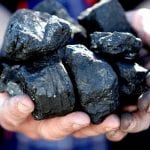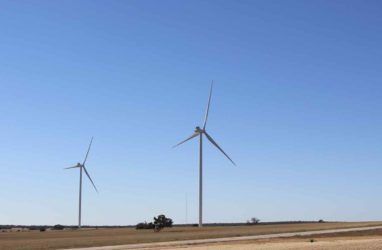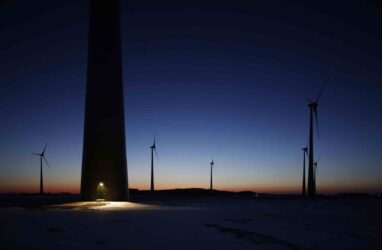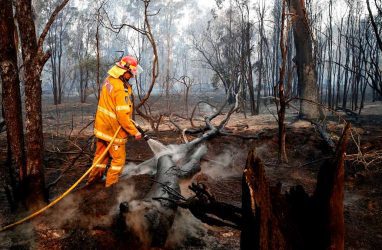Feed aggregator
Independents want coal and gas projects buried in net zero clause rather than Safeguard bans
 Independents suggest new gas projects should meet net zero standard for the life of project, in compromise deal on Safeguards Mechanism.
Independents suggest new gas projects should meet net zero standard for the life of project, in compromise deal on Safeguards Mechanism.
The post Independents want coal and gas projects buried in net zero clause rather than Safeguard bans appeared first on RenewEconomy.
Hot and humid autumn sets record demand levels in Queensland grid
Queensland experiences record grid demand at the tail end of another heat wave.
The post Hot and humid autumn sets record demand levels in Queensland grid appeared first on RenewEconomy.
Boom cycle means 82 pct renewables target is doable, says regulator
 Clean Energy Regulator says 82 per cent renewables target is within reach, but new installations need to ramp up.
Clean Energy Regulator says 82 per cent renewables target is within reach, but new installations need to ramp up.
The post Boom cycle means 82 pct renewables target is doable, says regulator appeared first on RenewEconomy.
How did millions of fish die gasping in the Darling – after three years of rain?
What Australia could do with $368 billion on the very real climate threat
 Australia is willing to spend $368 billion on submarines to protect national security. What could it do with that money to counter the very real climate threat?
Australia is willing to spend $368 billion on submarines to protect national security. What could it do with that money to counter the very real climate threat?
The post What Australia could do with $368 billion on the very real climate threat appeared first on RenewEconomy.
The Aukus deal is a crime against the world’s climate future. It didn’t have to be like this | Jeff Sparrow
By the time Australia gets its first nuclear-powered submarines, ecological collapse will already have reshaped world politics
Under the terms of the government’s nuclear submarine purchase, the first Australian-built Aukus class vessels come into service in the early 2040s. What else might be happening then?
According to the IPCC, at current rates, the planet will have warmed more than 1.5C above its pre-industrial state. In fact, many scientists believe temperatures could smash the 1.5C barrier as soon as 2030 or 2035 – that is, around about when Australia receives the first of its Virginia-class nuclear subs.
Continue reading...Transition state of play – Germany is emerging from the energy crisis
 A year after the launch of Russia's attack on Ukraine, Germany appears to be emerging from the energy crisis relatively unscathed and its clean energy targets in tact
A year after the launch of Russia's attack on Ukraine, Germany appears to be emerging from the energy crisis relatively unscathed and its clean energy targets in tact
The post Transition state of play – Germany is emerging from the energy crisis appeared first on RenewEconomy.
What can we expect from the final UN climate report? And what is the IPCC anyway?
 This week the world will receive the latest United Nations climate report. And it’s a big one.
This week the world will receive the latest United Nations climate report. And it’s a big one.
The post What can we expect from the final UN climate report? And what is the IPCC anyway? appeared first on RenewEconomy.
NSW in landmark crown land tender for major solar and wind projects
 NSW in innovate role reversal, offering crown land for use by major wind and solar developers after striking deal with landholder.
NSW in innovate role reversal, offering crown land for use by major wind and solar developers after striking deal with landholder.
The post NSW in landmark crown land tender for major solar and wind projects appeared first on RenewEconomy.
Rare 6ft shark washed up then decapitated on Hampshire beach
Historian Dan Snow pleads for person to come forward who removed head from animal washed up on Lepe beach
An appeal has been launched to recover the head of a rare smalltooth sand tiger shark after the fish was washed up on a Hampshire beach.
The 2 metre (6ft) long shark was initially found on Lepe beach on Friday.
Continue reading...Extinct but not gone – the thylacine continues to fascinate us
Samoa PM urges world to save Pacific people from climate crisis obliteration
Fiame Naomi Mata’afa pleads for action before landmark IPCC report is expected to issue ‘final warning’
The world must step back from the brink of climate disaster to save the people of the Pacific from obliteration, the prime minister of Samoa has urged.
On the eve of a landmark report by the Intergovernmental Panel on Climate Change which is expected to deliver a scientific “final warning” on the climate emergency, Fiame Naomi Mata’afa, Samoa’s prime minister, issued a desperate plea for action.
Continue reading...From city centre to riverside idyll, the massacre of our sylvan treasures has to stop | Henry Porter
Last Wednesday morning, the people of Plymouth woke to a scene on the city’s Armada Way that looked very much like a landscape ravaged by war, trees felled and uprooted as if by artillery shells. And the shocking part was that the felling of more than 100 trees was plotted in secrecy and executed at night by the very people who are meant to love their city, protect its environment, and honour the wellbeing and wishes of its inhabitants – the local council.
No surprise in that, you may say, but what happened in Plymouth was a singular example of bad faith, a betrayal and an act of contempt towards Plymouth’s citizens. The damage done to the environment and to trust is unlikely to be reversed for many years.
Continue reading...Paradise (almost) lost: bypass threatens to destroy Cambridge farmland rich in wildlife
Coton Orchard can literally boast a partridge in a pear tree – but the idyll is threatened by a busway scheme, which campaigners say is totally unnecessary
The Coton Orchard is the eighth largest traditional orchard left in the UK, its owner Anna Gazeley is proud to say. “Not because we’re huge but because 80% have gone since the 1900s,” she said. Commercial fruit trees are smaller and more productive, but this orchard is filled with wildlife, a legacy of Gazeley’s father, who bought the land three decades ago to save the trees from developers.
That may have been a temporary reprieve. The fate of the the trees and farmland west of Cambridge will be decided on Tuesday, when Cambridgeshire county council votes on a £160m scheme to include a bus bypass that would tear through the orchard.
Continue reading...Why worry about an import ban on hunting trophies when you can bag one at home? | Catherine Bennett
An alliance that brought together conservationists, African leaders, taxidermists, recreational hunters and the patron saint of upskirters, Christopher Chope MP, is recovering, its protests having last week failed to prevent the progress of Henry Smith’s hunting trophies (import prohibition) bill towards enactment.
These trophies being – incomprehensibly for anyone whose love of animals does not express itself in killing them – the dead animal’s body parts, brought home for display or sale. A recent US Humane Society investigation at a Safari Club International convention found, for instance, “elephant skin luggage sets ranging from $10,000 to $18,000 and jewellery made from leopard claws”.
Continue reading...Cyclone Gabrielle: The New Zealand flood victims too scared to go home
Breeding birds in captivity may alter their wing shapes and reduce post-release survival chances
Research into critically endangered orange-bellied parrot finds 1mm difference in length of one feather is enough to reduce survival rate by 2.7 times
- Follow our Australia news live blog for the latest updates
- Get our morning and afternoon news emails, free app or daily news podcast
Breeding in captivity can alter birds’ wing shapes, reducing their chances of surviving migratory flights when they are released to the wild, new research suggests.
A study of the critically endangered orange-bellied parrot has found that in captive-bred birds, those with altered wing shapes had a survival rate 2.7 times lower than those born with wings close to an ideal “wild type” wing.
Continue reading...‘A wake-up call’: total weight of wild mammals less than 10% of humanity’s
From elephants to tigers, study reveals scale of damage to wildlife caused by transformation of wildernesses and human activity
The total weight of Earth’s wild land mammals – from elephants to bisons and from deer to tigers – is now less than 10% of the combined tonnage of men, women and children living on the planet.
A study by scientists at Israel’s Weizmann Institute of Science, published this month, concludes that wild land mammals alive today have a total mass of 22m tonnes. By comparison, humanity now weighs in at a total of around 390m tonnes.
Continue reading...Drone footage shows millions of dead fish in river near Menindee - video
Drone footage filmed above a stretch of the Darling-Baaka River near the Australian town of Menindee showed millions of dead fish blanketing the water on Saturday. The New South Wales Department of Primary Industries said the deaths were related to low oxygen levels after the extreme flooding in the region in January had receded. It is the latest in a series of large-scale fish deaths that have prompted questions about the management of water levels in the Murray-Darling Basin
- ‘The smell is next level’: millions of dead fish begin to rot
- ‘Unfathomable’: millions of dead fish blanket river near Menindee
Pigs and ponies join UK’s wild bison to recreate prehistoric landscape
Ancient breeds will act as ecosystem engineers to convert commercial pine plantation into a wild wood
The UK’s first wild bison in millennia have been joined by iron-age pigs, Exmoor ponies and longhorn cattle as the rewilding project moves forward in creating a rich and natural new habitat.
The Wilder Blean project in Kent is deploying the animals to replicate the roles played by mega-herbivores when bison, aurochs and wild horses roamed prehistoric England. The animals will be closely monitored as they transform a former commercial pine plantation into a wild wood.
Continue reading...


